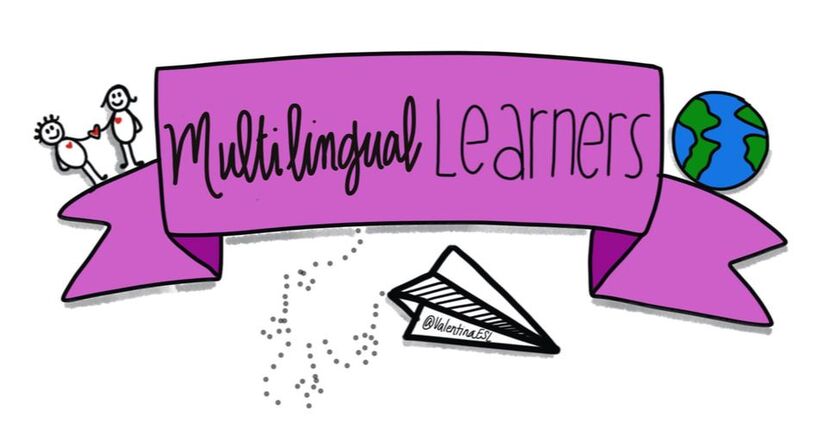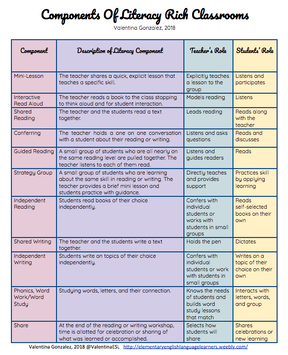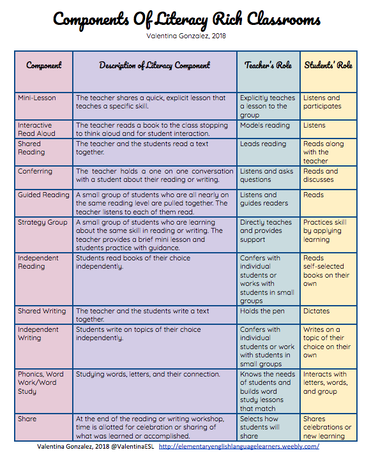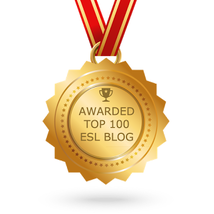|
The next few posts will be related to one another regarding the topic of literacy instruction as it pertains to English learners. The focus will be specifically on supporting English learners in English Language Arts classrooms and accommodating instruction and materials to promote growth and success. But let's begin by setting the foundation for our work with some common definitions or terms. Balanced Literacy: Balanced literacy is an approach to teaching language arts that includes various components such as comprehension, word study, fluency, and writing. Balanced literacy relies on integration and differentiation of instruction, student grouping, and materials and resources. Some say that this approach lacks direct instruction and is week in phonics. Others believe that balanced literacy provides a student centered/led environment for teaching reading and writing. Reading Workshop: This is a structure for teaching reading. Reading workshop is not a program. Reading workshop begins with a mini-lesson that is teacher led. Then students go off to read independently from self-selected texts. As students read, the teacher either pulls a guided reading group, a strategy group or confers with students one-on-one. About mid way through the workshop time, the teacher stops to do a quick mid-workshop teaching point. The final part of the workshop is a brief sharing time. Writing Workshop: Writing workshop (WW) is very similar to reading workshop. It too, is a structure for teaching writing and is not a program. WW begins with a mini-lesson that is teacher led. Then students go off to write independently on self-selected writing topics. As students write, the teacher either pulls a guided writing group, a strategy group or confers with students one-on-one. About mid way through the workshop time, the teacher stops to do a quick mid-workshop teaching point. The final part of the workshop is a brief sharing time. Phonics, Word Study & Spelling: Students learn about the relationship between letters and sounds as well as the structure and meaning of words. Read Aloud: The teacher reads a text aloud to students. Students listen and follow along if the text is available to them. The teacher acts as a model for reading fluency and prosody. In addition, the teacher models thinking aloud to make reading visible to students. Shared Reading: Students and the teacher read a text together as a class. The text can be a book book, a book that everyone has, a poem that is enlarged for the class to see, or other. To make shared reading more accessible for all students, teachers may either employ choral reading or echo reading. Choral reading is when all students read the same text at the same time. Echo reading is when the teacher reads a sentence first and then the students mimic the teacher's prosody and phrasing. Guided Reading: Small groups of students who are working at the same or similar reading level. The group meets together with the teacher. The students read the same book at the same time in a whisper as the teacher visits each child to offer support and guidance. The goal is to help students advance in reading levels. Strategy Groups: Small groups of students who need support on the same reading or writing skill. The group meets together with the teacher. The teacher delivers a short mini-lesson and the students apply the learning with the support and guidance of the teacher. The goal is to help students learn strategies to improve their reading or writing. Conferring: This is a brief, one-on-one conversation between the teacher and a student. The teacher and student discuss reading or writing. The structure is research, compliment, decide, teach. Conferring can also provide teachers with data to form strategy groups. Resources I recommend on this topic: The Fountas and Pinnell Literacy Continuum The Book Whisperer Reading Workshop 2.0 When Kids Can't Read Every Child a Super Reader Understanding Texts & Readers Read more about Balanced Literacy here. For a downloadable file of the Components of Literacy Rich Classrooms, see below or click here.
0 Comments
Your comment will be posted after it is approved.
Leave a Reply. |
Categories
All
|
||||||



 RSS Feed
RSS Feed
